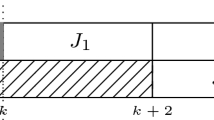Abstract
This paper considers a variant of the classical problem of minimizing makespan in a two-machine flow shop. In this variant, each job has three operations, where the first operation must be performed on the first machine, the second operation can be performed on either machine but cannot be preempted, and the third operation must be performed on the second machine. The NP-hard nature of the problem motivates the design and analysis of approximation algorithms. It is shown that a schedule in which the operations are sequenced arbitrarily, but without inserted machine idle time, has a worst-case performance ratio of 2. Also, an algorithm that constructs four schedules and selects the best is shown to have a worst-case performance ratio of 3/2. A polynomial time approximation scheme (PTAS) is also presented.
Similar content being viewed by others
References
Garey, M.R. and D.S. Johnson. (1979). Computers and Intractability: A Guide to the Theory of NPCompleteness. New York: Freeman.
Graham, R.L. (1972). “Bounds on Multiprocessing Timing Anomalies.” SIAM Journal of Applied Mathematics 17, 416–429.
Graham, R.L., E.L. Lawler, J.K. Lenstra, and A.H.G. Rinnooy Kan. (1979). “Optimization and Approximation in Deterministic Sequencing and Scheduling: A Survey.” Annals of Discrete Mathematics 5, 287–326.
Hall, L.A. (1998). “Approximability of Flow Shop Scheduling.” Mathematical Programming 82, 175–190.
Johnson, S.M. (1954). “Optimal Two-and Three-Stage Production Schedules with Setup Times Included.” Naval Research Logistics Quarterly 1, 61–68.
Néron, E., F. Tercinet, and A. Eloundou. (2000). “Scheduling Identical Jobs on Uniform and Multi-Purpose Machines.” INFORMS, San Antonio.
Potts, C.N. (1985). “Analysis of a Linear Programming Heuristic for Scheduling Unrelated Parallel Machines.” Discrete Applied Mathematics 10, 155–164.
Sevastianov, S.V. and G.J. Woeginger. (1998). “Minimizing Makespan in Open Shops: A Polynomial Time Approximation Scheme.” Mathematical Programming 82, 191–198.
Tanaev, V.S., Y.N. Sotskov, and V.A. Strusevich. (1994). Scheduling Theory. Multi-Stage Systems. Dordrecht: Kluwer Academic.
Vaidya, P.M. (1989). “Speeding Up Linear Programming using Fast Matrix Multiplication.” In Proceedings of IEEE 30th Annual Symposium on Foundations of Computer Science, pp. 332–337.
Author information
Authors and Affiliations
Rights and permissions
About this article
Cite this article
Gupta, J.N., Koulamas, C.P., Kyparisis, G.J. et al. Scheduling Three-Operation Jobs in a Two-Machine Flow Shop to Minimize Makespan. Annals of Operations Research 129, 171–185 (2004). https://doi.org/10.1023/B:ANOR.0000030687.72169.c7
Issue Date:
DOI: https://doi.org/10.1023/B:ANOR.0000030687.72169.c7




